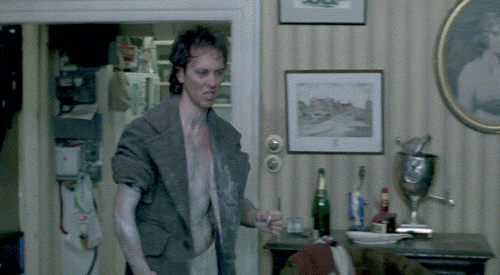Today, my little grammar muffins (whatever they are), we shall be looking at Me vs I, and when to do the Re-flex-flex-flex-flex. Sort of.

I had this exact ‘do at this exact time. Just so you know.
So, which is it —and me, or —and I?
In accordance with fings-they-lerned-me-at-school and that one electrocution elocution lesson I attended back in the summer of 1986 (the idea of which, if you know me AT ALL, is fucking hilarious), you and I sounds posh. It just does. And if you choose it over you and me, no matter the context, it gives the impression that you have a bit of dosh to throw about. THAT’S WHAT THEY TOLD ME.
They were wrong. To prove my point, here’s a pair of toffs off the telly, who’ve *volunteered to help us out with a little exercise. I’m paying them in booze.
*Pic stolen wholesale from Google.

A pair of toffs off the telly.
Now, Mr. Toff might be inclined to caption the pic thus: “My wife and I.” (They’re pictured here at Balmoral’s annual squirrel-tickling festival, I’m told.) But he’d be wrong. It’s “My wife and me.” Why? Well, you wouldn’t say, “Here’s a photo of I,” would you?
I mean, just listen to how SILLY this is: “Here’s I at the Mountbattens’ monthly frog-rogering contest.” See?
So yeah —it’s “Fuckface and me.”
It is, of course, fine to use I in the grammatically correct manner:
“Edgar and I are planning a spiffing party. Would you like to join us?”
Or:
“My husband and I shall be going dogging in New Brighton this evening, if you’re out and about.”
If you bump Edgar off, and do away with the husband, you’re left with: “I am having a dinner party and then I shall be going dogging.” See? Perfect sense.
Disclaimer: the above example is in no way autobiographical. Ahem.
Them wot write songs have a lot to answer for, too; Geri Halliwell’s dreadful “Lift me Up” springs to mind:
Watch the first light kiss the New World
It’s a wonder, baby like you and I
All the colours of the rainbow
Going somewhere, baby like you and I
AAAARRRRRGH! *Shouts “You and ME” at the car radio twenty years ago.*
How to remember the thing about the thing: cover up the “you and” bit. If the sentence still makes sense, you’re good. Using the same vintage spice example as above: “It’s a wonder, baby, like I” sounds shite, whereas “It’s a wonder, baby, like me” still sounds shite. But at least it’s correct.
More food for thinky thoughtstuff: is the title Withnail and I correct? Well, it depends what’s implicit, and what floats your own paticular proverbial. If it’s “Here’s a bunch of shit that Withnail and I got up to…” then it makes complete sense. But if it’s “The story of Withnail and I,” then it’s incorrect, and should be “Withnail and Me.” You could argue a case for either, really, if you had enough time and/or the inclination. Which I don’t. But here’s some braingrub anywho:
Withnail and I went on holiday by mistake.
or:
Withnail and me went on holiday by mistake.

Yeah. It’s I. DO NOT MESS WITH THE ‘NAIL.
Speaking of dinner parties, someone once asked me, by text, “would you like to come to Steve and I’s on Saturday?” I couldn’t answer, what with the BLEEDING EYES ’n’ all. True story.
Now, allow me to introduce … myself.

Myself/yourself/himself/herself/themselves … yadda yadda … are all reflexive pronouns; i.e. a pronoun [me/you/him/her/them] that reflects right back at … itself. Like a reflection, really. But not really.
If you’re looking for a swanky explanation, WIKI says: “In general linguistics, a reflexive pronoun, sometimes simply called a reflexive, is an anaphoric pronoun that must be coreferential with another nominal (its antecedent) within the same clause.” Ain’t nobody got time for that (at this point, you might want to refer to the ‘double negatives’ blog I haven’t written yet).
“I don’t like myself” or “I’m going to reward myself for finally finishing that 120,000 word novel after seventeen years” are fine.
Using “Gordon Ramsey and myself are going to cook you a meal” is bollocks. Gordon wouldn’t allow anyone else in his kitchen. Unless, of course, they were conveniently placed just so he could swear at them. But why ELSE is it bollocks?
Well, you wouldn’t say “Myself are going to cook you a meal”, would you? You’d say “I am…” Same as before, folks —same as before. Cover up the first bit and see if it still makes sense.
Office-speak has a lot to answer for *sigh* …
Alright, alright —I’ll wrap it up. Off y’go. Be sure to tune in to the next instalment: *THE GAPING MAW OF A PLETHORA OF A MYRIAD OF CREATIVE WRITING CLASSES. WITH TENTACLES.
*I might come up with a better title before then.



